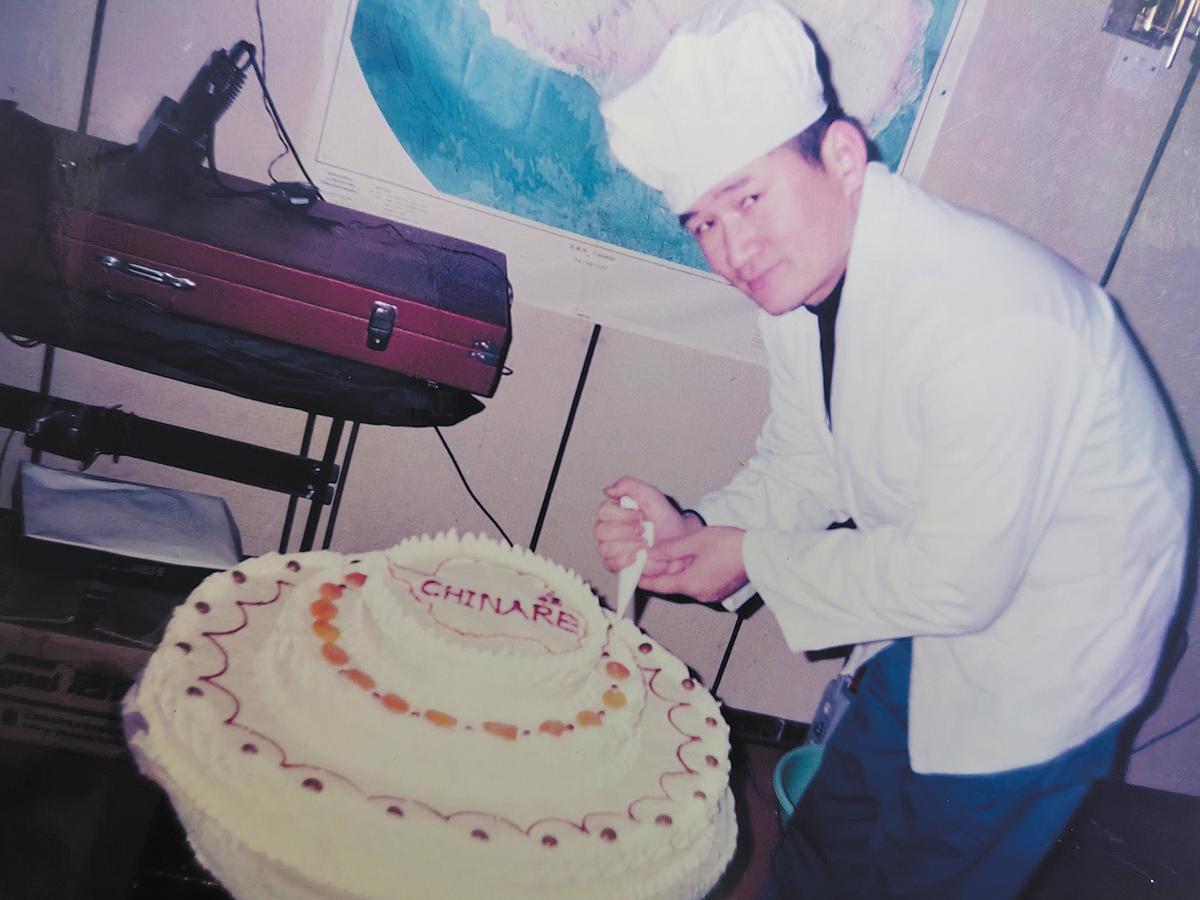
Xia Rongjun decorates a cake for Chinese polar expedition members at Zhongshan Station in Antarctica. [Photo provided to CHINA DAILY]
Throughout history, groups of people such as soldiers and expedition crews braving the great outdoors have been fueled by the food they ate. More recently, the same can be said of polar exploration teams.
During his tenure with China's 15th Antarctic expedition from 1998 to 1999, chef Xia Rongjun demonstrated extraordinary culinary skills under limited conditions, helping to improve the health of the crew as they worked in the icy region. The chef's innovative approach has been influential in subsequent polar expeditions.
Enticing outsiders
Due to the strong winds in Antarctica, the aroma of the hot meals prepared at Zhongshan Station could still be smelled as far as 100 kilometers away at Australia's Davis Station. Sometimes, these foreign crews couldn't resist the temptation and visited Zhongshan Station for a meal, according to Xia.
"The Russians and Australians there mainly have Western food such as bread, pastries and fruits, but no Chinese cuisine," he said.
Interestingly, the pleasant smells wafting from the station not only attracted people, but also penguins, seals, skuas and petrels, the chef said.
Xia used braised beef as an example.
"After braising a portion of premium Australian beef we purchased, it exuded a flavor that Australians themselves struggled to reproduce," he explained. "On one occasion, a member of the Australian team even spent $500 on beef and requested that I braise it for him, leaving me feeling flattered."
Xia brought a great variety of delicious Chinese food to Antarctica during his stay, creating a smorgasbord that included over 40 dishes involving braised meats, noodles, soups, desserts, pastries and fruits. The chef said he carefully selected the dishes being served, taking the health of his diners into consideration.
"I worked with a doctor, using data from our team members' monthly checkups to craft a nutritious menu," he said proudly. "The extensive menu spanned nearly a hundred pages and was preserved as a resource for future team members."
Cured by cuisine
During the polar night, an 80-day period during which there was no sunlight, workers developed pale complexions and struggled with a lack of calcium, leading to dental issues, weak bones and overall weakness and fatigue.
The inadequate light made outdoor work hazardous, so most individuals remained inside the station until the polar night concluded. The solitude and quietness of the polar region created a melancholy atmosphere, creating mental health problems among some members of the group. The harsh environment placed significant psychological strain on the workers.
Xia admitted that he was also affected by the polar night blues and tried to find ways to cope.
He initially spent a lot of time honing his cooking skills, but he soon discovered that the team had developed little enthusiasm for his food and ate sparingly. To get them interested, he proposed a collaborative idea where people from various Chinese regions could join him in the kitchen and prepare some of their local dishes and snacks.
It turned out to be the spark the team needed.
"Amazingly, people bounced back through their cooking and tasting of hometown dishes that they had missed for months," Xia said.
Due to the contributions of the team members hailing from places such as Beijing, Shanghai, Qingdao in Shandong province, Dalian in Liaoning province and Xiamen in Fujian province, the team was able to enjoy a range of new dishes. These included Beijing-style hot pot, Xiamen snacks and Shanghai specialties.
"Each dish exuded a truly authentic flavor that delighted our taste buds," the chef said.
He added that later, they voted to decide which region's dishes were the best, and the popular ones were kept on the menu.
"This approach successfully motivated everyone, and was at the forefront of the fond memories we had of passing those polar nights," Xia recalled. "Years later, when we reunited, we talked about the food and how much we missed the taste of those dishes."
In great shape
After a year at Zhongshan Station, the supply of vegetables and fruits was running low. Liu Shuyan, the station leader of the 16th expedition, brought new supplies with him to the station.
When Liu arrived, he gave each member a hug and a punch on the chest, saying, "Your team's mental outlook is the best I've ever seen," according to Xia.
"Our mental state was indeed excellent. Each member underwent strict physical examinations before departure and another upon return, and the comparison showed that we had maintained very good health," the chef said.
"What's noteworthy is that the results after the return showed that our physical condition was the best among all 15 expeditions, according to the State Oceanic Administration and Polar Research Institute of China," he added.
Xia was responsible for cooking for 200 people each day.
In general, he prepared meals three times a day, but increased it to five times daily during the polar day period. During that time, the team took advantage of the constant sunlight and warmer weather, sometimes working over 18 hours a day.
As a result, Xia said he also had to work longer hours. To maximize his availability, he placed a camp bed next to the kitchen storeroom with two quilts, so he would be ready to get up and continue working at any time, he said.
lipeixuan@chinadaily.com.cn